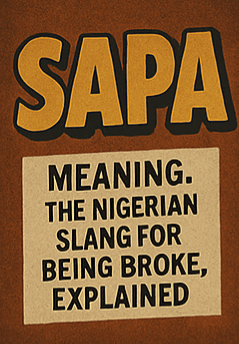
If there is one word that encompasses the emotional and financial realities of young Nigerians, especially in recent years, it is Sapa. You’ll hear it everywhere, from the streets to skits, WhatsApp conversations to TikTok captions. Sapa does not respect anyone, and it does not arrive gently.
What Does “Sapa” Mean?
Sapa is a Nigerian slang term meaning serious financial hardship. It’s more than simply being broke; it’s also being down badly.
- There is no money.
- No alert.
- No food.
- Nothing for pos, even your bank app will misbehave.
In this situation, even ₦200 seems luxurious, and the only options are a miracle, sugar mama, or urgent 2k.
So when someone says, “Sapa hold me” or “Sapa don catch am,” it means they’re absolutely broke and life is now humbleing them.
Origin and how it blew up
“Sapa” became popular about 2020, during the peak of the COVID-19 lockdown, when people were out of job.
And money was tight. The word is most likely derived from Yoruba or Warri street slang, but no one genuinely owns it anymore because Sapa has become a national issue.
By 2021 to 2023, it has fully infiltrated Nigerian pop culture, with TikTok users, comedians, and skit creators using it to represent anything related to poverty, a lack of funds, or hustle failure.
How Sapa is Used in 2025
Now, in 2025, “Sapa” is part of everyday survival language. If you’re planning a hangout and your guy says:
Bro, I’m not fit to come. Sapa is by my side.
That’s not simply an excuse; it’s a plea for assistance.
It is also used ironically.
“Why are you chopping Indomie without egg?”” — Sapa.
“Who did she leave you for, Benz?””—Sapa shows you shege.
“Na Sapa dey make me humble this week.”
There are now whole sketch characters that symbolize the “Sapa-infected” lifestyle, such as guys wearing only one slipper, begging for transportation, or dodging POS agents.
TikTok, Skits, and Music Influence.
Influencers such as @ogbrecent, @iamnasboi, and @sabinus helped “Sapa” content go popular. They would create sketches that someone was balling one week, Sapa smacked them, and they began borrowing rice the next.
In music, artists are now including “Sapa” into lyrics to represent street problems. For example:
- “Sapa no be anybody mate.”
- “I dey pray make Sapa no near my side again.”
Even renowned performers such as Asake, Zlatan, Zinoleesky, and Bella Shmurda have made direct references to “Sapa” or painted its lifestyle.
Variations and Sarcasm
“Sapa United” refers to a group of pals that broke up together.
- “Sapa don win this round.”
- “Sapa with full confidence.”
- “Sapa dey dance Azonto for my account.”
People even convert it into prayer
“God abeg, Sapa no go see me again.”
Conclusion
Sapa is more than just a slang term; it represents a national experience. It depicts the shared misery and amusing aspects of being broke in a country where even ATMs dread you.

Leave a Reply